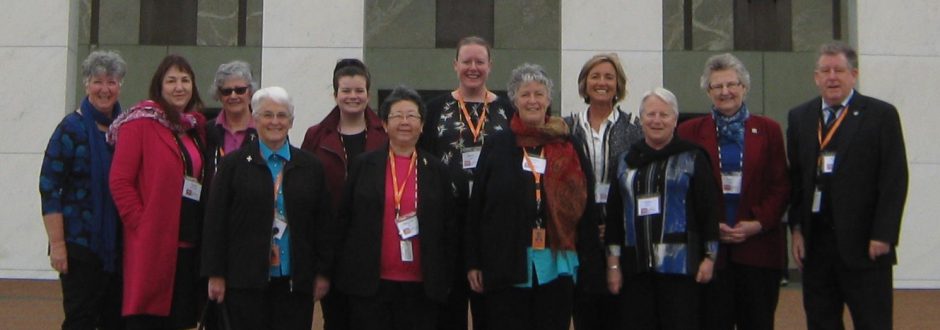Labour exploitation in Australia is a massive problem and becoming worse. And it’s not like our parliamentarians are unaware of the facts, writes Good Samaritan Sister Sarah Puls.
BY Sarah Puls SGS
“What are our three jobs this week?
“To ask for money. To sort out labour exploitation. To get a national compensation scheme.”
The first day of the advocacy week in Canberra with ACRATH is always a bit overwhelming. It’s the day before we begin our week of meetings with any Senator or Member of the House of Representatives who is willing to see us. We gather, a group of experienced and newer advocates, with diverse and rich backgrounds. We’ve been communicating for weeks leading up to this day, but today we’re working on practicalities, like immersing ourselves in the particular advocacy points for this year, and trying to anticipate the questions we will be asked in return.
ACRATH (Australian Catholic Religious Against Trafficking in Humans) is a group of Catholic religious women and men, and lay people who are committed to the elimination of human trafficking. We travel from around Australia to raise our concerns with parliamentarians and meet with a wide range of people to raise awareness.
Over the last ten years, ACRATH has worked with others to advocate for changes, such as improved support for people who have been trafficked into Australia, and addressing slavery in the supply chain of products imported to Australia.
This year we have the task of asking for funding because our grant runs out within a year and we can’t survive without further funding. I begin to feel embarrassed, like a beggar, ashamed to have to ask for money, and I wonder if I will be able to do it when the time comes. But then we move on to other discussion points and my feelings of embarrassment fade into nothing in the face of the needs of the people we come here to represent and fight for.
I laugh when our leader says our second task is to “sort out labour exploitation”! I think, ‘sure, and we’ll build a house while we’re at it! That’s about as achievable’. Labour exploitation in Australia is a massive problem and becoming worse. And it’s not like our parliamentarians are unaware of the facts.
In March a senate report, titled “A National Disgrace: Exploitation of Working Visa Holders”, provided evidence of significant exploitation of vulnerable workers and made 33 recommendations to address these issues and work towards change. Yet, not one of these 33 recommendations has been taken up and there is no sign yet that they will be.
Sometimes I feel like our job in ACRATH is to be a pebble in the shoe of people who have the power to make the real changes to address these issues. Sometimes we are a pebble that jumps back into the shoe over and over! We come and tell them again about the real people who are affected by these issues.
We tell them of a group of men who had been working in a rural area from dawn to dusk, seven days a week, and received just $70 per week. These men, who have since moved on, never received just payment, and their work and the exploitation they endured was never recognised. We tell the Members of Parliament we meet of how these men didn’t know they were entitled to more. We give a human face to a sad and preventable reality.
Of course our little band of ACRATH members cannot “sort out” labour exploitation, but we can tell the human stories and remind our elected representatives that we can, and we must, do better.
Our third job this week is to advocate for justice for people who have survived trafficking, slavery and slavery-like conditions. We come to this work as people who are not experts in law, but who are passionate about justice for all people, especially those who are most vulnerable. We invite the people we speak with to see the human person who has experienced great trauma and loss, and to understand how a national compensation scheme which accommodates their particular needs, is necessary.
Coming to Parliament House and spending days talking with our elected representatives reminds me how much good will there is in humanity, and especially in our politicians. People are often surprised to know that this work of meetings and advocacy is a work which brings me great hope. Advocating on the issue of human trafficking is not toxic in the current political environment, as some issues are, because everyone already agrees that slavery is bad and that we should stop the trafficking of people.
Our job is to ensure that our politicians are not turning away from the issue, that they understand how real people’s lives are being destroyed here in Australia, and that they know what they can do to make changes for the better.
ACRATH has been advocating for these issues for over ten years now. We remain committed to this advocacy and everything else we do, because the human rights and human dignity of real people are at stake. We meet the real people, we hear their stories, and we know how high the stakes are.
So when the moment comes, I take a deep breath and say: “Senator, our first request is for your support in seeking further funding so that ACRATH can continue to…”.
